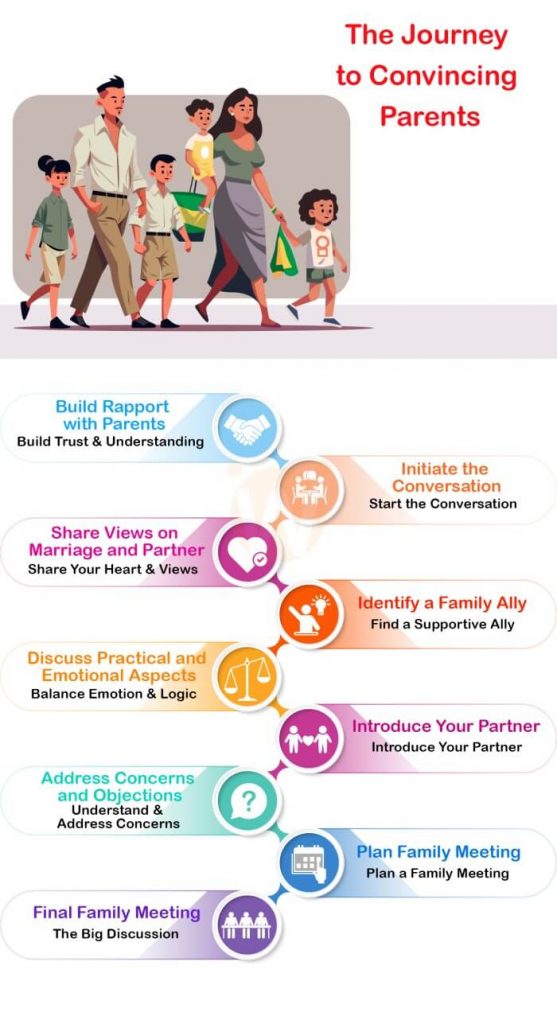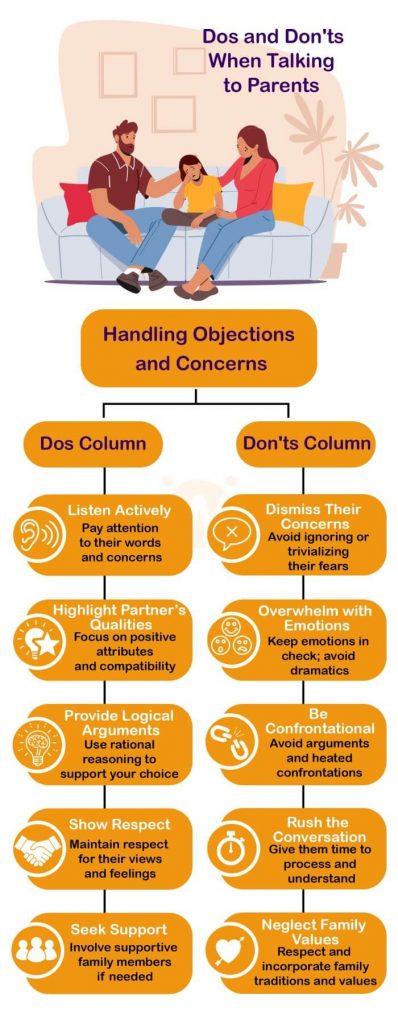Tips to Convince Parents for Love Marriage: A Comprehensive Guide
By Prapoorna M
Last Updated: December 22, 2021
In the rich tapestry of Indian culture, marriage stands out as a pivotal institution, deeply rooted in social, religious, and traditional values. It’s not merely a union of two individuals but a profound bond that weaves together families, communities, and generations. The sanctity and respect afforded to marriage in India are unparalleled, making it a significant life event celebrated with grandeur and reverence.
However, as modern influences blend with traditional values, young couples in India often find themselves at a crossroads, especially when it comes to love marriages. Unlike arranged marriages, which are predominantly guided by parental choice and societal norms, love marriages stem from personal choice and mutual affection between partners. This divergence often leads to a classic tussle between tradition and modernity.
Book Relationship Counselling Now

Young couples frequently face challenges in convincing their parents to accept a marriage founded on love. The reasons for this resistance are manifold. For many Indian parents, arranged marriages are a trusted system, deeply intertwined with cultural practices, social expectations, and a long history of being the norm. Love marriages, on the other hand, may seem to challenge these long-standing traditions and can evoke fears of social stigma, questions about compatibility, and concerns over community acceptance.
1. Understanding Parental Concerns
Understanding why parents might be hesitant about love marriages is crucial in addressing their concerns. In many cases, these apprehensions are rooted in cultural norms and traditional beliefs that have been upheld for generations. Parents might worry about the preservation of cultural heritage, religious practices, and adherence to social norms, which they believe are essential for a harmonious married life. Additionally, in a society where family reputation and honor hold significant value, parents might fear that a love marriage, especially if it crosses caste or religious boundaries, could attract social scrutiny and criticism.
Furthermore, traditional beliefs often emphasize the role of parents in selecting a suitable partner for their children, based on factors like family background, social status, and horoscope compatibility. Deviating from this norm through a love marriage can be seen as undermining parental authority and wisdom.
Empathizing with parents’ perspectives is a critical step in this delicate negotiation. It’s important to acknowledge that their concerns stem from a place of love and a desire to ensure the best for their children. Demonstrating empathy involves listening attentively to their fears and apprehensions, validating their feelings, and respectfully presenting your viewpoint. It’s a delicate balance of honoring age-old traditions while gently introducing the concept of change and adaptation to new societal norms.
In addressing these challenges, the approach should be one of understanding and patience, paving the way for a dialogue that bridges the gap between traditional expectations and modern love.
Comparing Love vs Arranged Marriages
| Aspect | Love Marriage View | Arranged Marriage View |
|---|---|---|
| Choice of Partner | Based on personal preference, love, and mutual understanding. | Often influenced by family, cultural, and social considerations. |
| Compatibility | Determined by the couple based on their relationship and shared interests. | Assessed by families based on background, education, and horoscope. |
| Family Expectations | May not always align with family expectations; the couple prioritizes their choice. | Aligns with family expectations; emphasizes family compatibility. |
| Involvement of Family | Family involvement comes later in the relationship, often after the couple decides to marry. | Families are involved from the beginning, playing a key role in partner selection. |
| Social Considerations | Less emphasis on social status, caste, or community. Focuses more on the individual. | Strong consideration of social factors like caste, status, and community reputation. |
| Decision-Making | Decisions are primarily made by the couple. | Decisions are influenced or made by family members or elders. |
| Dating and Courtship | Pre-marriage relationship is common, allowing for deeper understanding before marriage. | Limited courtship period; emphasis on commitment from the outset. |
2. Building Rapport with Parents
Establishing a strong rapport with parents is a foundational step in navigating the conversation about love marriage. Effective communication and trust are the bedrocks of this process. Here are some strategies to enhance these aspects:
- Frequent and Open Communication: Start with increasing the frequency of your conversations. Talk about your daily life, interests, and views. This regular communication builds a foundation of trust and openness.
- Active Listening: Show genuine interest in your parents’ lives and opinions. Listening actively to their experiences, worries, and aspirations can create a more empathetic and understanding relationship.
- Shared Activities: Engage in activities that your parents enjoy. It could be as simple as helping out with household chores, watching a favorite TV show together, or participating in a family hobby. Shared experiences can create a stronger bond.
- Respect and Patience: Always approach discussions with respect. Understand that building rapport is a gradual process that requires patience and consistent effort.
Building rapport is also key in navigating relationship dynamics, similar to those between a mother-in-law and daughter-in-law.
3. Initiating the Conversation
Approaching the topic of love marriage requires tact and sensitivity. Here’s how to initiate this delicate conversation:
- Gradual Introduction: Instead of directly announcing your decision, gradually introduce the concept. Discuss topics related to marriage, love, and companionship in general to test the waters.
- Use Indirect Narratives: Share stories or incidents of friends or relatives who had love marriages. This can be a non-threatening way to gauge your parents’ reactions and thoughts on the subject.
- Highlight Positive Examples: Mention successful love marriages within your social circle or community. Focus on the aspects that made these marriages successful, such as mutual understanding, respect, and shared values.
- Seek Their Opinion: Casually ask for their opinion on love marriages. This can provide insights into their thoughts and potential concerns, giving you a better understanding of how to frame your conversation when you reveal your own love story.
- Empathetic Approach: Show empathy towards their beliefs and concerns. Acknowledge that while times are changing, you respect and understand the values they hold dear.
These steps are aimed at creating a comfortable environment for open and honest discussion. Remember, the goal is to foster understanding and mutual respect, paving the way for a more accepting and supportive response to your decision.
4. Sharing Your Views on Marriage and Partner
Effectively communicating your views on marriage and your partner is essential in helping your parents understand your perspective. Here’s how you can do it:
- Express Your Values and Preferences: Start by sharing your thoughts on what qualities you value in a life partner. Discuss attributes like compatibility, mutual respect, shared goals, and emotional connection rather than focusing solely on love.
- Introduce Your Partner’s Qualities: Gradually introduce your partner by highlighting their qualities, achievements, and the positive impact they have had on your life. Ensure this is done subtly and in a context that aligns with your family’s values.
- Balance with Parental Expectations: Acknowledge your parents’ expectations and beliefs. Explain how your partner aligns with not just your preferences, but also with the values and expectations your family cherishes.
- Use Real-Life Examples: Share stories of couples who have similar backgrounds or circumstances to yours and how they have successfully built a life together. This can help parents visualize and understand your perspective better.

5. Identifying an Ally in the Family
Having an ally within the family can significantly ease the process of convincing your parents. Here’s how to identify and leverage this support:
- Observe and Identify: Pay attention to family members who are more open-minded or who have always supported you. This could be one of your parents, a sibling, a grandparent, or even an aunt or uncle.
- Seek Their Guidance: Approach this family member privately. Share your situation and seek their advice. Their experience and understanding of the family dynamics can offer valuable insights.
- Gather Support: If they are supportive, discuss how they can help in gradually introducing the idea to your parents. Their endorsement can add credibility to your choice.
- Plan a Strategy Together: Work with them to find the best way to present your case to the rest of the family. It could be through casual conversations, during family gatherings, or a formal discussion, depending on what suits your family’s style.
Having an ally in the family not only provides you with emotional support but also helps in creating a more accepting environment for your views. Their influence and understanding of family dynamics can be instrumental in swaying the opinion of more resistant family members.
6. Practical and Emotional Arguments
When discussing your choice of a life partner with your parents, a balanced approach that includes both practical and emotional aspects can be more persuasive. Here’s how to present your case:
- Focus on Practical Aspects: Begin by highlighting the practical benefits of your relationship. Discuss how your partner’s educational background, career aspirations, and life goals align with your own. Emphasize shared responsibilities and future plans, including financial stability and career development.
- Showcase Compatibility: Explain how your values and life philosophies align with those of your partner. Discuss how this compatibility contributes to a stable and harmonious relationship, which is a key factor in a successful marriage.
- Avoid Overly Emotional Arguments: While it’s important to mention love and emotional connection, avoid basing your entire argument on these aspects. Phrases like “I can’t live without them” may be perceived as immature. Instead, focus on how your partner complements and supports you in various aspects of life.
- Share Success Stories: Cite examples of other couples, especially within your community or circle, who had similar backgrounds and have had successful marriages. This can help parents see the practicality of your choice.
Just as balancing practical and emotional arguments is vital in love marriages, it is equally important in handling marital relationships.
7. Involving Extended Family and Elders
Respected elders and relatives can play a crucial role in convincing your parents. Here’s how to involve them effectively:
- Identify Influential Relatives: Look for family members who have a strong influence on your parents and who may be more open-minded or supportive of your choice.
- Seek Their Advice and Support: Approach these relatives privately and explain your situation. Ask for their advice and support. Sometimes, hearing from a peer can make parents reconsider their stance.
- Discuss Your Partner’s Merits: When discussing with elders, focus on your partner’s merits that are most likely to appeal to them, such as educational qualifications, family background, or character.
- Plan a Joint Approach: If they agree to support you, plan how they can best approach your parents. It could be through informal conversations or a more formal family discussion.
- Respect Their Decision: If they choose not to get involved, respect their decision. Pushing them might strain your relationship and could work against you.
Elders often hold a place of respect in Indian families, and their opinions can significantly influence parental views. Their support can lend credibility to your choice and can be a powerful tool in convincing your parents.
8. Introducing Your Partner
Introducing your partner to your parents is a significant step in your journey. Here’s how to prepare for it:
- Brief Your Partner: Inform your partner about your family’s values, traditions, and the personalities of each family member. Discuss any sensitive topics or potential concerns your family might have. This preparation will help your partner in making a positive first impression.
- Anticipate Reactions: Prepare your partner for possible reactions from your parents. Whether it’s skepticism, curiosity, or warmth, knowing what to expect can help in handling the situation calmly.
- Choose an Appropriate Setting: Select a comfortable and neutral setting for the meeting. It could be a quiet restaurant or a family gathering at home. Ensure the environment is conducive to a relaxed and open conversation.
- Facilitate Easy Conversation: Initially, steer the conversation towards general and non-controversial topics before gradually moving to more personal discussions. This approach helps in easing any initial awkwardness.
9. Handling Objections and Concerns

Your parents might have reservations or objections. Here’s how to address them:
- Listen Actively: Give your parents space to express their concerns. Listen without interrupting, which shows that you respect their opinions and are taking their concerns seriously.
- Respond with Facts and Empathy: Address their fears with facts. For example, if they are worried about cultural differences, discuss how you and your partner plan to embrace both cultures. Empathize with their concerns by acknowledging them and showing how you have considered these aspects in your decision.
- Discuss Societal Norms Tactfully: If concerns about societal perception or caste issues arise, acknowledge their worries and share your perspective on how society is evolving. Highlight examples of successful inter-caste or inter-community marriages within your social circle.
- Highlight the Positive: Focus on the positive aspects of your relationship, such as mutual respect, understanding, and shared life goals. Emphasize how your partner complements you and contributes positively to your life.
- Seek Support from Allies: If you have identified an ally within the family, their presence during these discussions can be comforting and can help mediate the conversation.
Emphasizing the Positive Aspects

To reinforce the positive side of your decision, focus on these areas:
- Strengths of Your Relationship: Share specific examples of how your relationship has positively impacted your life. Discuss the support, understanding, and growth you’ve experienced with your partner.
- Partner’s Qualities: Highlight your partner’s virtues, achievements, and how they align with your family’s values. This can help your parents see your partner in a positive light.
- Success Stories: Share examples of successful love marriages within your community or family. These real-life stories can demonstrate that love marriages can be fulfilling and stable.
Highlighting the positive aspects in love marriages is as important as focusing on positive parenting techniques.
Planning for a Formal Meeting Between Families
Arranging a meeting between both families is a crucial step:
- Decide on the Setting: Choose a comfortable and neutral place for the meeting. It could be a home environment or a quiet restaurant, depending on what both families would prefer.
- Prepare Each Side: Brief both families about each other’s backgrounds, preferences, and expectations. This preparation helps in avoiding any surprises and ensures a smoother interaction.
- Facilitate Open Communication: Encourage open and respectful dialogue during the meeting. It’s important that both families feel heard and respected.
Being Patient and Respectful
Patience and respect are key in this journey:
- Time and Understanding: Understand that convincing your parents might not happen overnight. It’s a process that requires time, patience, and persistent effort.
- Continuous Dialogue: Maintain ongoing communication with your parents. Keep them involved and informed about your relationship, and continue to address their concerns respectfully.
- Respect Their Feelings: Acknowledge your parents’ emotions and viewpoints. Show them that while you are firm in your decision, you still value and respect their opinions.
Conclusion
Navigating the path to convincing parents about love marriage in Indian society is a delicate process that hinges on empathy, understanding, and clear communication. This guide outlines steps like understanding parental concerns, building rapport, introducing one’s partner thoughtfully, and addressing objections with a mix of practical and emotional reasoning. Each strategy aims to promote open dialogue and respect, bridging the gap between traditional values and personal choice in matrimonial matters.
Wellness hubs play a crucial role in supporting individuals through the stresses associated with these negotiations, offering mental and emotional health resources. The importance of these hubs in the guide underscores the holistic approach needed in such discussions—not only in achieving a consensus but also in maintaining the couple’s overall well-being. This comprehensive approach highlights the journey’s core: the pursuit of harmonious love marriages that respect both individual choices and cultural heritage.
Frequently Asked Questions: Convincing Parents for Love Marriage
1. How do I start a conversation with my parents about love marriage?
Start by gently introducing the topic, sharing positive stories of love marriages, and subtly discussing the qualities you value in a partner. Choose a relaxed time to bring up these discussions, showing respect and openness to their views.
2. What are effective ways to address cultural objections from parents regarding love marriages?
Understand the cultural objections your parents might have and address them with respect and empathy. Share stories of love marriages within your culture that have been successful and highlight how your partner respects and is willing to embrace your cultural practices. Demonstrating your commitment to maintaining cultural traditions can help alleviate some of their concerns.
3. How can I prepare my partner for meeting my parents?
Prepare your partner by discussing your family’s values, traditions, and the personalities of your family members. Forewarn them of potential sensitive topics and advise them on how to navigate these discussions. Encourage them to be themselves while showing respect for your family’s culture and values. This preparation can set the stage for a positive and respectful first impression.
4. What if only one of my parents supports my decision?
If one of your parents is supportive, work with them to understand the best approach to influence the other parent. Their support can be instrumental in gradually changing the perspective of the less supportive parent, especially if they share insights into what arguments or explanations might be most persuasive.
5. How can I convince my parents if they are worried about societal judgment?
Address concerns about societal judgment by focusing on the positive aspects of your relationship and the changing attitudes towards love marriages. Provide examples of other couples who have faced similar challenges but have gone on to have successful and happy marriages. Emphasize the importance of your happiness and the compatibility between you and your partner, which are crucial for a lasting marriage.
6. Should I involve other family members or elders in convincing my parents?
Involving other family members or elders can be a strategic move if you believe they will be supportive and can influence your parents positively. Choose someone who is respected by your parents and who understands your situation. Their support can lend credibility to your decision and provide a different perspective that your parents might be more willing to consider.
7. How long should I expect the process of convincing my parents to take?
The process of convincing your parents can vary significantly in length, depending on their initial stance, cultural beliefs, and the dynamics of your relationship with them. It’s important to approach this with patience and persistence, maintaining open and respectful communication throughout. Be prepared for it to take time and effort to address their concerns and reservations.
8. How do I balance my own happiness with my parents’ expectations?
Balancing your happiness with your parents’ expectations involves clear communication about your feelings and the qualities you value in your partner. Explain how your partner meets these criteria and aligns with both your happiness and your parents’ expectations. Show how your partner complements you in ways that are important to your family, emphasizing shared values and mutual respect.
9. What if my parents refuse to meet my partner?
If your parents are initially unwilling to meet your partner, give them time to adjust to the idea. Continue to share positive aspects of your relationship and address any concerns they may have. Demonstrating your commitment to your partner and the seriousness of your relationship can help ease their resistance. Be patient and maintain open lines of communication.
10. How can I maintain a positive attitude throughout this process?
Focus on the long-term goal and remember the importance of your relationship. Seek support from friends, your partner, or understanding family members. Stay hopeful, and remember that change often takes time.
About the Author:
Prapoorna Mangalampalli
M.Sc., M.A., (Dual Masters in Psychology & English) – Counselor (6+ years of experience)
Prapoorna armed with a passionate dedication fueled by dual Master’s degrees in Psychology and English, Prapoorna sheds light on and elevates human experiences. Over 6+ years of experience fuel her insightful approach to counseling, offering profound empathy and guidance across diverse areas like online, marital, relationship, child, family, and career counseling.
At Wellness Hub, she thrives in a team environment that values innovation, compassion, and achieving results for their clients.
Connect with Prapoorna to learn how she can help you or your loved one find their voice and build a brighter future.
Book your Free Consultation Today
Parent/Caregiver Info:
Client’s Details:
* Error Message








